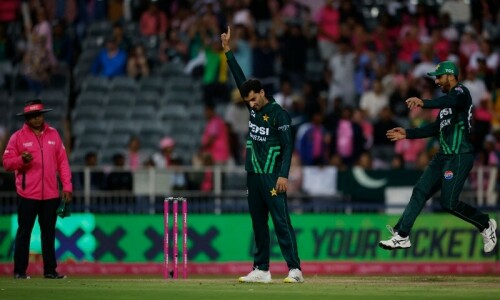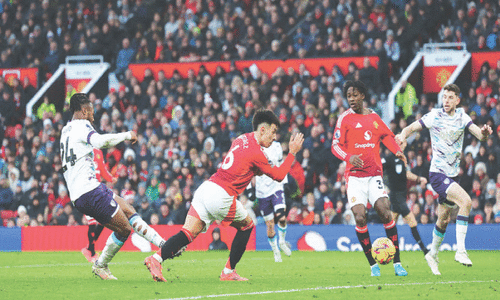MUMBAI: Making India the top team in all formats of the game will be the priority for Indian board (BCCI) president Anurag Thakur, the 41-year-old said after taking charge of the world’s richest cricket board on Sunday.
The top BCCI job, often called the most powerful position in cricket because of India’s financial muscle in the sport, has been vacant since Shashank Manohar resigned this month to take over as chairman of the International Cricket Council.
The Board of Control for Cricket in India (BCCI) elected one of its youngest ever presidents in a meeting in Mumbai where the parliamentarian representing India’s ruling Bharatiya Janata Party was the lone candidate for the post.
“Currently our team is number two in Tests and T20 and number four in ODIs and in women’s cricket,” Thakur told reporters. “We will take every step whatever is possible to make India number one in all four.”
Since this year’s World Twenty20 on home soil, the Indian team has been without a coach. Thakur said the board would advertise the post and shortlist the applicants after June 10.
Often led by seasoned administrators, the BCCI is perceived as an efficient but opaque body run by industrialists and politicians.
Thakur said he was lucky to have learnt from three BCCI chiefs — Jagmohan Dalmiya, Narayanswami Srinivasan and Manohar — who also headed the International Cricket Council.
He takes charge at a time when the board is under pressure from India’s top court to bring about change.
“We have introduced many reforms in the last 15 months...We will further strengthen it,” Thakur said. “Transparency, accountability and professionalism will be part of BCCI’s working. Nobody is perfect. Wherever there are issues, we’d try and rectify that. As the custodian of the country’s most popular sport, we’re aware of our responsibilities and we’ll fulfil out duties.”
The board has earmarked one billion Indian rupees ($14.84 million) for a ‘green initiative’ for new and existing stadiums, Thakur said.
He told a packed press conference after the meeting that the reforms were a continuous process, and the BCCI was ready to take them to ‘the next level’.
“Whatever is possible and practical and is required, we are implementing that from time to time. I see an opportunity here, it’s time to deliver,” he said
However, he followed Manohar in remaining intransigent on a Supreme Court recommendation calling for a ban on television adverts between overs during live broadcasts.
Thakur, who was previously secretary of the BCCI, will have his hands full as the BCCI is under enormous pressure to introduce reforms after being tarnished by scandals including accusations of corruption and match-fixing in the glitzy Indian Premier League.
In the wake of those scandals, the Supreme Court ordered a retired judge to draw up a report on the BCCI’s governance to try to avoid future conflicts of interest.
Justice Rajendra Mal Lodha’s report recommended the BCCI introduce age limits for its office-bearers and bring in the advert ban.
Manohar quit the BCCI presidency earlier this month, saying the reforms were not in the BCCI’s best interests and he felt he could no longer carry on in his role.
On Saturday Manohar, who then became the first independent chairman of the International Cricket Council (ICC), told reporters that the recommendations on no adverts between overs ‘would destroy the financial structure’ of the BCCI.
Thakur, a three-time MP in Himachal Pradesh state, pointed out to journalists that newspapers run adverts beside stories about the Indian Premier League.
“The BCCI gets its revenue from advertisements and that is how we pay our employees and our state association,” he said.
But he insisted the BCCI was ‘not running away from the recommendations’.
“We understand our responsibility towards the most popular sport in India and we will give our 100 percent,” Thakur said.
Thakur has been involved with the BCCI since he was elected president of his state association aged just 25. Last year he pipped the incumbent to the secretary’s post by a single vote.
The BCCI benefits from huge TV deals that allow it effectively to run the world governing body — the ICC — along with its allies, Australia and England.
However under reforms that Manohar had himself supported, it is no longer possible to be both ICC chairman and to head the national board of a member country.
Manohar had been serving as head of the ICC in his role as president of the BCCI in line with the organisation’s previous system of rotating chairmanships.
But under the reforms, the ICC has amended its constitution to bring in direct elections for the position. It will now be officially an independent post, a move designed to ensure the incumbent no longer feels obliged to promote his own country’s interests.
Published in Dawn, May 23rd, 2016















































